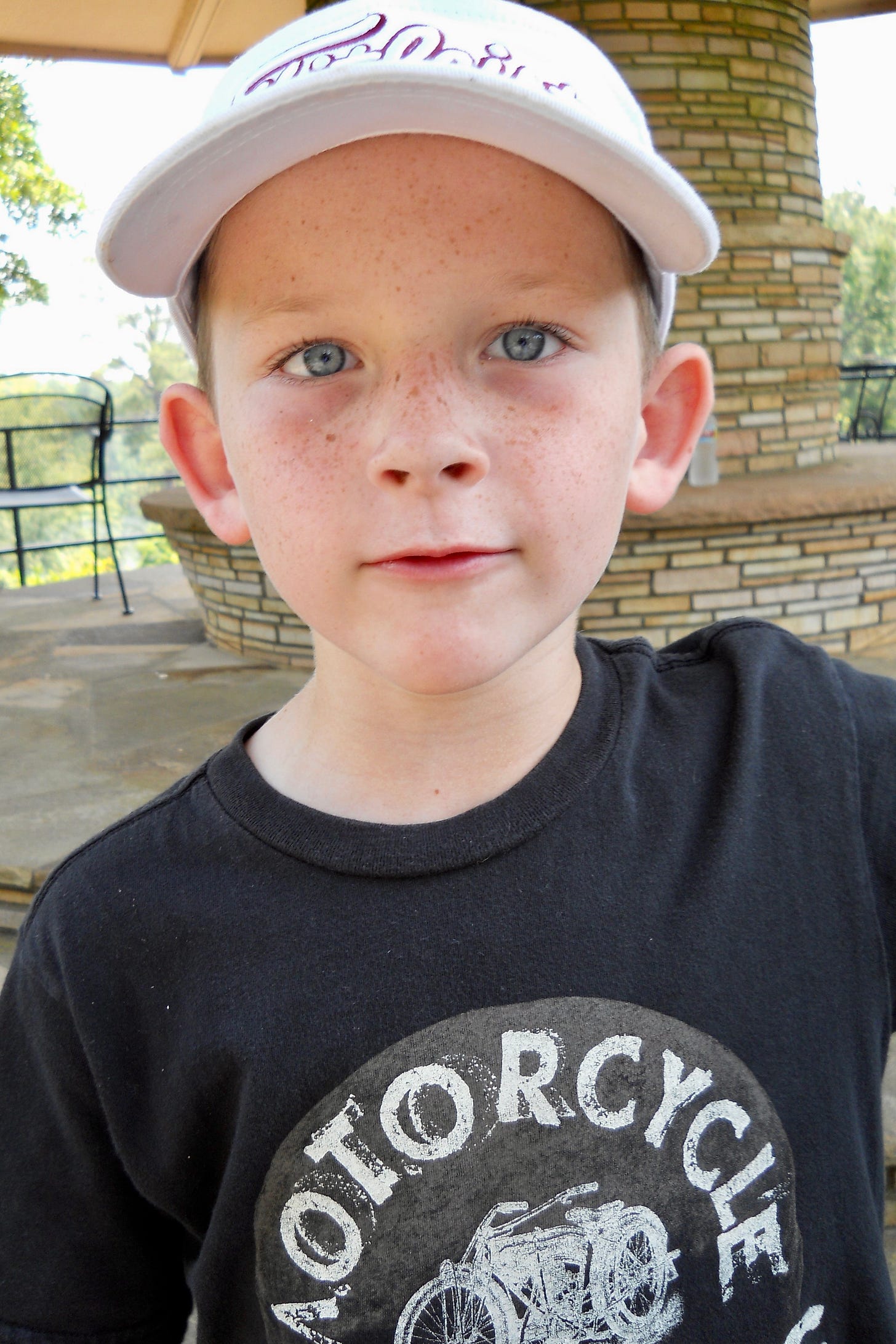When you have a young adult child in crisis you tend to examine the history of their being, turning it over and over again, trying to imagine a point where an alternate storyline could have been effected. Something other than the current circumstances.
Could I somehow have caught this sooner? Early enough to fix it, to fix him before we got to this point?
Ah, yes, we mothers. We fix things. We patch skinned knees and referee sibling arguments. We schedule the stylist to help with the botched-up hair after the 5-year-old tests out his barbering skills. We console after a family pet dies. We act as a buffer between our children and the hurts of this world.
But children grow up. They become (if you let them) individual humans independent of you. They pull away and defy and choose differently. They test the waters and push the boundaries and cross the line.
Where did this rebelliousness come from? Surely I taught him better than to engage in such reckless behavior. Or did I?
Years ago we were exploring a state park with two other couples and our collective children when I came upon yellow caution tape at a part of the property called Flag Island.1 A sign indicated we should Keep Out because of loose stones in the walkway.
How lame and fear-of-lawsuit-fueled, I thought as I stepped under the tape and told my youngest child it was okay to go in because we were going to be careful where we stepped. We walked the 100 feet or so to see the flags then exited the area. No big deal, right?
Later in the day, the same child (Jonah)2 was with our friends in their canoe when one adult explained why they shouldn’t paddle into a certain area that was off-limits. “We wouldn’t want to be rule breakers, would we?”
Without hesitation, the nine-year-old deadpanned, “My mom is.”
He totally outed me!3 And for a moment I wondered if by crossing that yellow tape I had singlehandedly launched an outlaw into the world.
Maybe I could have somehow caught this sooner. Or maybe I’m the one who actually set this in motion.
One night last week I got an email that Jonah was “phasing up” and would start a job the next day.4 If you haven’t read about Jonah’s recent job interview, you should check out this post for context:
News of his progress was an uplifting moment, evidence of his hard work these last three months in rehab—confirmation that all the hell we’d endured to get him there was paying off.5
As I lay in bed that night, my mama brain heart was grinding. I hope he has a ride lined up. Will he remember to pack a lunch? I’m sure he’s going to be a anxious on his first day. I wish I could give him a hug or a thumbs up or a “You’ve got this.”
My mind flew back to 2006. The church we attended had activities for kids on Sunday nights, and one particular night all the kids ascended the stage in “Big Church” and sang a song for the parents and other adults.
I watched Jonah standing there on the front row at the stage’s edge with a microphone mounted directly in front of him. He wasn’t singing a solo or anything—that’s just where one of the mics happened to land. The music started. The kids began to sing. And Jonah stood there with a look of discomfort that grew second by second into utter anxiety. Everyone else was singing except him. His lips began to quiver, and tears pooled in his eyes.
When they spilled onto the freckles of his plump, smooth cheeks I could no longer bear it. I swiftly moved to the stage and plucked him off, pulling him against my body. He wrapped his four-year-old legs around my waist and tucked his face into the curve of my neck.

This mama hated seeing her child struggle in the spotlight—anxious, nervous, self-conscious, embarrassed. Now that he’s an adult, my concern when he’s distressed hasn’t changed. I still anguish over his struggle. What has changed, however, is my response.
When he was four, it was my role to scoop him up, kiss him, and (try to) make everything better—to give them that safe place to land. Now that Jonah is grown, my job is to listen, encourage, pray, and (most importantly) let him figure it out with all the resources available to him. And to trust that he will.
I still contemplate his history—who he is and how he arrived here, but I know there was nothing I could have done to change any of this. I cannot fix another human. Not even my own kid. That’s not really how growth and maturity work.
When I think about what my son has done and been through, I don’t get a warm, fuzzy feeling. But I have learned to be grateful for his path.
Several years ago, my mother-in-law shared a passage she had read in Israel’s Feasts and Their Fullness by Batya Wootten in a chapter titled “Repentance and Returning - Tashlich and Teshuvah.”
“Concerning repentance and teshuvah, Rabbi Simon Jacobson writes in his book, 60 Days: A Spiritual Guide to the High Holidays:
‘Before you can embrace the right path, you must leave the wrong path; you must regret having taken it and you must go away from it. The idea of teshuva is not just repenting, but also includes the idea of returning….It’s not just damage control, it is returning to the essence that was always pure—it is returning to G-d.’
Paul the Apostle, also defines repentance: ‘I now rejoice, not that you were made sorrowful, but that you were made sorrowful to the point of repentance; for you were made sorrowful according to the will of God, so that you might not suffer loss in anything through us. For the sorrow that is according to the will of God produces a repentance without regret, leading to salvation, but the sorrow of the world produces death’ (2 Cor 7:9-10).
‘Repentance without regret’ sounds like an oxymoron, like opposites that could not possibly go together, yet in the economy of the Holy One, the two add up to perfect repentance. On the one hand, we are very sorry and repentant for what we did. But on the other hand, we learned valuable lessons from the experience, which in turn brought positive changes in us, and that makes it hard for us to ‘regret’ having chosen the path that we chose, even though it was a wrong path. Due to our own choices, we had to go down that particular path because we had to learn a certain lesson, and that led to ‘godly sorrow’ that produced good in us.”
Jonah’s learning some lessons the hard way. Heck, I have too in my nearly three decades of adulting. But when I look back, I wouldn’t pick another page in this choose-your-own-adventure experience because those mistakes are part of my essence now. And I rather like who I’ve become.
I recently read a post from George Saunders, who is downsizing in the later stages of life and recently cleaned out the large home where he and his family resided many years. He humorously called it “death-cleaning” and wrote:
“Doing this work, I keep encountering traces of my former self (in photos and letters and books I bought) and am struck by two things: 1) There really is no solid self. Who was that guy? Who is this one? 2) I have been so lucky in my family life…”6
“There really is no solid self.”
What a statement! I agree and disagree all at the same time.
Jonah (or any of us really) is not who he was at four. Yet, he is. At 30, he will not be the same self he is today as he progresses further and further into his sobriety. But his addiction will remain a part of his fabric for the rest of his days.
He will look back, to be sure, but I hope he does so without regret. And I hope he never stops looking forward because that is where his whole self will be—at the end of a life well lived.
Which was really a peninsula, not an island, but I won’t dwell on that since I’m trying to work on that character flaw where I point out the mistakes of others.
I do have other children. I just write about this one a lot because he gave me permission to tell you his stories.
Not that my best friends and their husbands didn’t already know about my rebellious nature.
In Jonah’s residential program, “Clients are required to complete the appropriate assignments and meet specific criteria before being eligible to progress through each Phase in Recovery Home.
Phase I of Recovery Home requires clients to begin job search – searching for or resuming existing employment, school, or volunteer opportunities. Clients may work between 25-40 hours per week 5 days per week (excluding Sundays) and must attend all structured programming (i.e., groups, activities, meetings) when not at work."
Not all rehabilitation programs work this way. In fact, I’d say most do not, which is a shame because I think this program does a great job of teaching “clients to apply new skills and insights to the real world and take responsibility for their mental health while still immersed in a therapeutic community. Clients have opportunities to process their reintegration into society with the community and staff to discuss what unforeseen problems arise and determine which skills are most effective in addressing those problems.”
And I’d walk through that fire all over again if I had to.









Holly,
Your words made a beeline straight to my heart this morning. I could actually say they made my heart ache, but not that I would change reading a single word. One doesn't need to have a child in rehab to be able to relate to your feelings/thoughts/misgivings/doubts about parenting. My children are 31 and 33 and I can still obsess about their hurdles. Becoming a parent is likely one of the most vulnerable things we can do in life, also one of the most rewarding. I'm happy that you are sharing your journey for others; but what I love most is that you are creating this supportive space for you and your son. That he is willing to share his journey says a great deal about him, and you. Keep up the great work! 💕
This is fantastic and so moving. Repentance without regret is an amazing concept--and so critical because coming to terms with past and then sharing it with others is maybe the thing that will help another addict or alcoholic to find their way out. Your son is lucky to have a rule-breaking, bad-ass Mom!